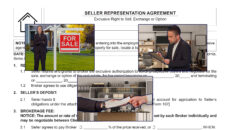This is the first episode in our new video series covering office management principles. This first episode introduces the concept of agency, and distinguishes the licensed activities which may be conducted by a broker or an agent.
Introduction to agency
As brokerage services became more prevalent in California in the mid-20th century and the public demanded greater consistency and competence in the rendering of these services, the state legislature began standardizing and regulating:
- who is eligible to become licensees and offer brokerage services;
- the duties and obligations owed by licensees to members of the public; and
- the procedures for soliciting and rendering services while conducting licensed activities on behalf of clients.
Collectively, the standards set the minimum level of conduct expected of a licensee when dealing with the public, such as competency and honesty. The key to implementing these professional standards is the education and training of the licensees.
Individuals who wish to become real estate brokers are issued a broker license by the California Department of Real Estate (DRE) only after completing extensive real estate related course work and meeting minimum experience requirements. On receiving the license, brokers are presumed to be competent in skill and diligence, with the expectation that they will conduct themselves in a manner which rises above the minimum level of duties owed to clientele and other members of the public.
For these reasons, the individual or corporation which a buyer or seller, landlord or tenant, or borrower or lender retains to represent them in a real estate transaction may only be a licensed real estate broker.
To retain a broker to act as a real estate agent, the buyer or seller enters into an employment contract with the broker, called a listing agreement. [See RPI Forms 102 and 103]
Broker vs. sales agent
Brokers are in a distinctly different category from sales agents. Brokers are authorized to deal with members of the public to offer, contract for and render brokerage services for compensation, called licensed activities. Sales agents are not. [Calif. Business and Professions Code §10131]
A real estate salesperson is strictly an agent of the employing broker. Agents cannot contract in their own name or on behalf of anyone other than their employing broker. Thus, an agent cannot be employed by any person who is a member of the public. This is why an agent’s license needs to be handed to the employing broker, who retains possession of the license until the agent leaves the employ of the broker. [Bus & P C §10160]
Only when acting as a representative of the broker may the sales agent perform brokerage services which only the broker is authorized to contract for and provide to others, called clients. [Grand v. Griesinger (1958) 160 CA2d 397]
Further, a sales agent may only receive compensation for the real estate related activities from the employing broker. An agent cannot receive compensation directly from anyone else, e.g., the seller or buyer, or another licensee. [Bus & P C §10137]
Thus, brokers are the agents of the members of the public who employ them, while a broker’s sales agents are the agents of the agent, the individuals who render services for the broker’s clients by acting on behalf of the broker. [Calif. Civil Code §2079.13(b)]
As a result, brokers are responsible for all the activities their agents carry out within the course and scope of their employment. [Gipson v. Davis Realty Company (1963) 215 CA2d 190]















I recognize the hard work that went into composing it and thank you for that. I will continue to support you even if you create more posts like this one. Please do it. I am grateful that you made this content available to me.